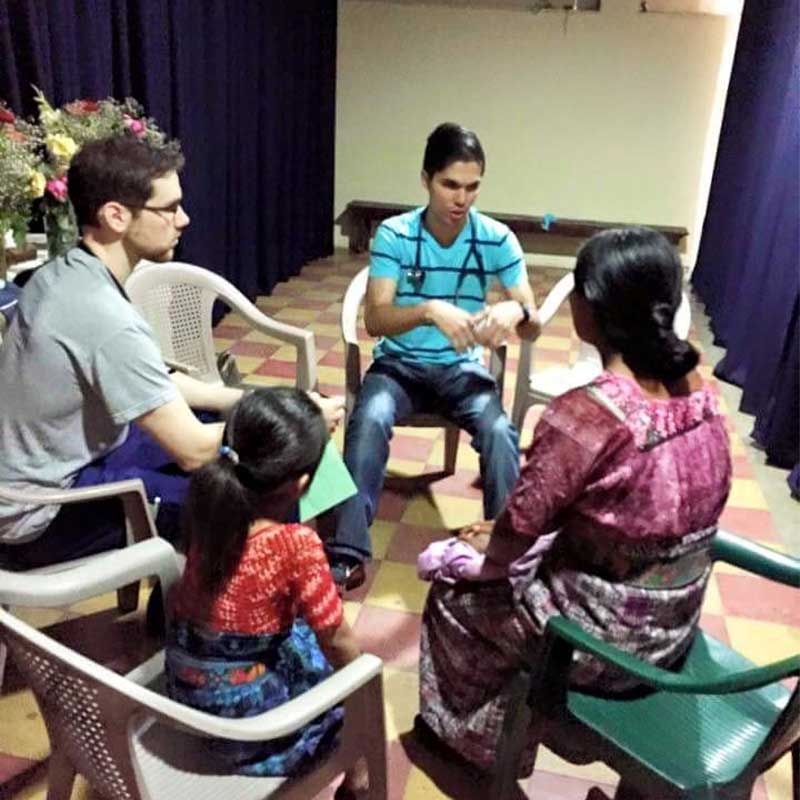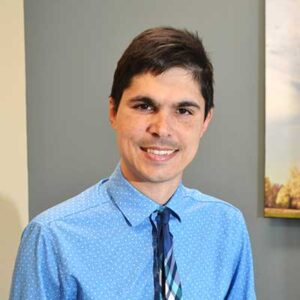CHI Saint Joseph Health MEDS & PEDS physician uses his skills and faith to bring healing care to his patients
LEXINGTON For Alexander Hernandez, MD, faith, family, and fate all played a role in his journey to become a “Meds and Peds” family practice provider at CHI Saint Joseph Health – Primary Care in Lexington, Kentucky.
His faith is the backbone of his patient care approach, being open to discussing his patients’ spiritual health as well as their physical conditions. He met his wife, Alyson, through their church. His father was a doctor, and Hernandez recalls following him doing hospital rounds in Miami as a young boy,

albeit without much youthful enthusiasm. He would rather have been playing baseball.
Hernandez, an internal medicine and pediatrics physician, grew up in Florida and completed his undergraduate education at the University of Central Florida, earning a BS in molecular biology and microbiology. Hernandez credits his father, along with his seventh-grade science teacher, for sparking his early interest in science and medicine.
“I was fascinated with how the human organs work in the body, the way the heart works, the way the gut works,” says Hernandez. “The more I studied, the more I realized that I’d be able to use that knowledge for good and help people. Now it’s all about getting to know my patients on a level where I can build the type of relationship with them where they never feel as if they’re being ignored.”
He came to Kentucky after attending Loyola University Chicago – Stritch School of Medicine, where he also earned his Master of Science in medical physiology. After matching for his residency program at UK in 2022, Hernandez said he fell in love with the people of Kentucky, and the community holds a special place in his heart because it’s also where he met his wife.
His UK residency gave Hernandez the serendipitous opportunity to work in a community outreach program hosted by CHI Saint Joseph Health, which led to being offered a position in primary care with the multi-pronged task of developing a “Med & Peds” practice that welcomed the Central Kentucky Hispanic population because Hernandez is fluently bilingual.
As someone who has been a camp counselor and worked on mission trips, Hernandez says he knew he wanted to work with kids. But his focus on becoming a “med-ped” was to make sure that the relationship didn’t end when his pediatric patients turned 18. They can still turn to him as a primary care doctor. Because he speaks both Spanish and English, Hernandez says he hopes to connect with people who often face hurdles in obtaining healthcare.

Building Trust Through Common Language
Having been in practice for a little over a year, Hernandez has watched his patient population steadily take shape: 70 percent adults and 30 percent pediatrics with about 20 percent of his patients being Hispanic. His adult patients present with typical problems of diabetes, COPD, hypertension, and gout. His pediatric patients can start as early as two weeks old and run through 18 years old. Some aspect of childhood obesity is frequently present, and Hernandez is quick to point out that “body shaming” in overweight children is a problem he addresses with understanding and compassion. “We encourage small, but important changes in their eating habits, eating more fruits and vegetables, limiting soda and sugar-filled drinks, getting more active,” he says.
Some of Hernandez’s Hispanic patients are bilingual, some speak only Spanish. “When my Hispanic patients learn that I can speak their native language, a bright light goes on in their faces. They are so relieved that they’ve found someone who can understand them easily, not condensed or translated by a family member. Some of them want to give me a hug, they’re so happy,” says Hernandez. “We start our doctor–patient relationship with a basis of trust built on common language and cultural understanding.” It is Hernandez’s intention to build a multigenerational family practice, from infancy through adolescence and adulthood. By caring for the different generations, Hernandez believes he will be able to more fully understand and treat the entire family’s health concerns. “Knowing the medical history and health conditions of parents or grandparents will give me insights into the health of the children,” he says. Diet, lifestyle, habits, both good and bad, possible inherited conditions, and family dynamics all play a role in the health of a family. “I want my patients to know that I’m someone they can trust, that I have their best interests as my priority,” he says.
Navigating Healthcare in the U.S.A
Going on medical mission trips to Panama in high school and Guatemala as a medical student was inspiring and informative for Hernandez. The experiences confirmed his intentions to be a caregiver and showed him first-hand the differences in healthcare found in the United States and Latin America. He recalls that on one of his mission trips that applying a simple medication and treatment for head lice in children was a significant act of care.
Another challenging aspect of healthcare for the newly arrived, Hispanic-speaking patients is how completely different the structure of healthcare systems are in the U.S. from Latin America. “Clinics in some parts of Latin America are much more informal,” says Hernandez. “In Cuba, for instance, it’s sometimes one large room with a doctor sitting at his desk and a row of chairs. Everyone sits in line, waiting their turn to talk to the doctor. In other areas of Latin America, such as in Mexico, clinics are informal compared to here, and patients may have their provider’s contact information readily available to text or call, but patients still have their privacy respected in clinics. Family medicine in Latin America is sometimes really just one big family event,” says Hernandez.
While some Latin American countries like Mexico have more advanced healthcare and access to specialists and medications, some countries like Cuba, says Hernandez, are less advanced and more restricted. He notes that he is seeing an increase in his Cuban patient population. Word seems to be spreading that there’s a Spanish-speaking doctor in town. “I tell all of my Hispanic patients to tell their family, friends, and coworkers that we’re here for them,” says Hernandez.
Faith and Healing
Primary care is similar to ER care, says Hernandez, in that he feels that he is on the front line. “I want to be the doctor who keeps people healthy and out of the hospital. But if a hospital stay is needed, to provide the medical history of their care for my hospitalist colleagues,” he says.
Hernandez says, “My philosophy with my patients ties into my faith. I want any patient that comes to me to understand that they are loved and cared for, and I am always here for them. Sometimes the process of receiving treatment can feel like it’s taking a long time, but I hope to communicate with my patients, in the best way that I can, to help them get through whatever it is they’re facing, reminding them of God’s mercy even in the most difficult of times, which is often when I see my patients.”
CHI Saint Joseph Health is a faithbased healthcare system, founded in 1877 by the Catholic Sisters of Charity of Nazareth in Kentucky, with a mission to provide compassionate care to the poor and underserved. It seems like a good fit for Alexander Hernandez.



